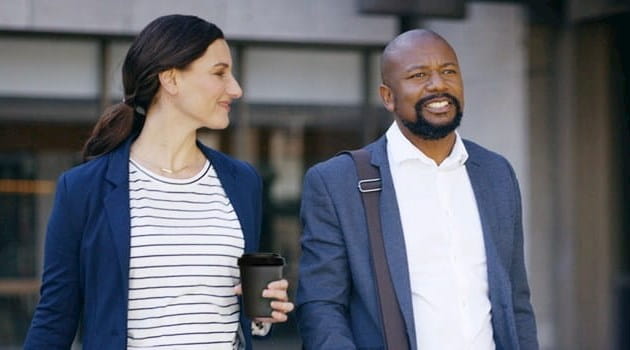“The problem with climate change is that it is so difficult to address: no single individual person or firm will make that much of a difference, but collectively they can make a significant difference,” says Jo Paisley, President of GARP Risk Institute, the thought leadership arm of the Global Association of Risk Professionals. “But the scale of the challenge is daunting — the world economy is like a huge tanker, and to try and make it turn is going to be a monumental effort.”
GARP, a not-for-profit membership organisation for risk professionals, is dedicated to the advancement of the risk profession through education, research and the promotion of best practices. Its flagship educational offering is the Financial Risk Manager (FRM®) certification, a Masters-level qualification.
But as a sign of the times, the association recently introduced the Sustainability and Climate Risk (SCR®) Certificate, their first new program release to the market in over a decade, which Paisley says demonstrates its significance.
“We have covered many different aspects of risk management in the Risk Institute, but I’ve been mainly focused on climate risk and sustainability since I joined GARP nearly four years ago. And that is because we saw an urgent need to build awareness and capability amongst risk and finance professionals. It’s also a new area of focus, and so it is an exciting area to be working on.
“Climate change issues have traditionally been the responsibility of corporate social responsibility functions in firms. But we felt that it needed the attention of risk managers as we could see that there was going to be genuine financial risks — both from physical risks associated with climate change and with transition risks as we move to a lower carbon economy. ”
Financial regulatory input
GARP also provides an important market link, serving as the Secretariat for two of the working groups on the Climate Financial Risk Forum (CFRF). The CFRF is an industry forum convened by the Prudential Regulation Authority and the Financial Conduct Authority to build capacity and share best practice for dealing with the financial risks and opportunities arising from climate change.
CFRF comprises five banks, five insurers and five asset managers and has established four working groups, working on scenario analysis, risk management, disclosures and innovation. The Forum published ten guides in their second year of operation, which should help financial firms who are just beginning to consider how to address these issues.
The conversation on risk with the regulators is propelled by a sense of urgency and awareness, says Paisley.
“It’s not just the regulators who have this growing awareness; it’s also investors, civil society, and politicians. Expectations are rising and our understanding of the risks is increasing. The best course of action for firms is to act now, as it may not be viewed as reasonable to say in five years’ time that you weren’t aware of the risks.
“The more we act now the better, as we have a greater chance of an orderly transition. But we will need both to adapt to the changing climate, as well as mitigate it. Certainly, it will be catastrophic if we don’t act to reduce greenhouse gas emissions soon.”
To limit global warming to 1.5oC above pre-industrial times, we must reach net-zero emissions by 2050.
“One of the things about ‘Net Zero by 2050’ is that it is a potentially convenient way to put off action; it seems like it's ages away, but it is not. And it’s critical that we start reducing emissions now. Indeed, we must decrease global emissions by 45% by 2030. Reaching Net Zero by 2050 is not sufficient - the path we follow to get there also matters.
“If firms think they can continue polluting then I don’t think they understand the seismic shift that’s going on.”
Closer to home
Climate change risk does not exist in a vacuum — a lack of cohesion and joined-up thinking can also have consequences.
“The current energy price spike that is driving up the price of retail energy is a good example of broader risk management lessons,” she says.
“There are always trade-offs with policy, and other characteristics have to be thought of, like the security of energy supply and cyber security. It’s not just about going green, it’s about doing all these other things as well.
“Don’t let good old fashioned risk management get overlooked. Remember operational resilience, business continuity and other traditional risks,” says Paisley. “Climate considerations need to be embedded into all these risks.”
Policy change
Climate change also presents significant commercial opportunities, says Paisley.
“People want this to happen — but we need the right policy framework, which includes having appropriate incentives. One key issue is ensuring that we put a price on carbon and other environmental impacts.
“If your firm addresses its impact on the environment, by tackling their carbon emissions through investing in new technology for example, it may put itself at a competitive disadvantage. Hence having a tax on carbon can help level the playing field.
That said, there are businesses who are recognising the scope for creating new businesses that are proving pretty disruptive for the incumbents — just think of Tesla and Beyond Meat. So whatever the policy environment, technological changes and shifts in consumer behaviour will be important drivers of change for businesses.”
But with all this change, we also need to be mindful of the need for a ‘just transition’.
“Many economists agree on the need for carbon pricing, but if fuel prices rise sharply in response, we need to think about how low-income households are going to cope with transition. Otherwise, you have lots of people left behind, resulting in many social problems.”
Unified planning
Added to this, the government also needs to think about the platforms and networks that might be needed. Take the case of electric and emission free transportation. Consumers are unlikely to transition to an EV just because petrol becomes a bit more expensive. They need to know that they can charge their car too. So changing relative prices may not be enough.
“People aren’t yet universally confident in the technology and they are much more expensive than their gas counterparts.
“We will need consistent and reliable policies that people have confidence in. If the government introduces subsidies to invest, it’s natural to ask how long they will be there for. If the policy framework isn’t credible, firms will be more reluctant to make the investments required.
“All in all, this shows just how much change there is going to be in the commercial environment in which firms operate. Those firms who take this seriously, invest in the skills and knowledge of their workforces, reconsider their own strategies and risk management approaches, will do much better than firms that just want it to go away.”


